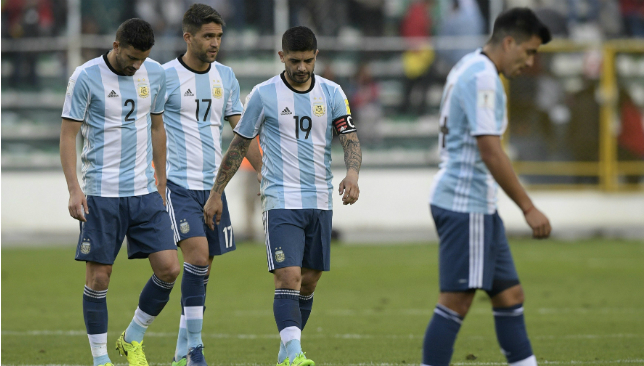
Argentina’s 2-0 defeat to Bolivia in La Paz on Thursday was no surprise. Anyone with half an eye on CONMEBOL World Cup qualifying saw it coming a mile off.
A 1-0 victory over Chile last week had done little to paper over the cracks of a side struggling in what has become the most competitive qualification process in World Cup history.
Lionel Messi came to their rescue once again, hitting a penalty to secure only coach Edgardo Bauza’s third win from seven qualifiers.
Bauza was a man under pressure, having failed to settle on a coherent system or consistent personnel since he replaced Gerardo Martino in August.
A two-time Copa Libertadores winner who impressed with Sao Paulo in Brazil, Bauza deserved a shot but, in truth, only got the opportunity because the likes of Mauricio Pochettino and Diego Simeone have bigger fish to fry in club football.
The suspensions of Lucas Biglia, Gonzalo Higuain and, most importantly, linchpin Javier Mascherano handed Bauza another blow ahead of Tuesday’s trip up to Bolivia.
Their hosts, who have no chance of qualifying, had also rested a number of influential first-team players for their game last week against Colombia in Barranquilla.
Argentina, then, faced an uphill task at the dizzy heights of La Paz, situated some 12,000 feet above sea level. And their fate was all but sealed as news broke of a four-match suspension for Lionel Messi.
Argentina head coach Edgardo Bauza has criticised FIFA for banning Lionel Messi so close to their game vs. Bolivia. https://t.co/RWbQPLJfLY pic.twitter.com/TyXVwi1ywh
— ESPN FC (@ESPNFC) March 29, 2017
His crime? A quite ubiquitous phrase that when translated into English sounds pretty unpleasant.
Sure, none of us want to go to work and hear a foul-mouthed tirade focusing on our mother’s genitals, but in Argentina it’s little more than a local idiom.
The original referee’s report contained no mention of the incident. Local media suggest FIFA acted only after Chile had lodged a complaint containing video evidence.
In a letter from FIFA to the Argentinian Football Association (AFA), which was published by Clarín, assistant referee Emerson Augusto do Carvalho said, “I only realised he was swearing when I read it in the press.”
Barcelona quickly branded the sanction as “unjust and totally disproportionate.” Even Bolivia president Evo Morales backed him, saying he disagreed with the decision and expressed his “solidarity with the best footballer in the world” Others went further.
Luis Suárez (just now): "Messi's ban?From now on they should suspend all the players who protest & insult. It is totally unfair & excessive" pic.twitter.com/5ZjmkJ66Oq
— Leo Messi (@messi10stats) March 29, 2017
Argentinians have always had a penchant for conspiracy theories. Was it because Messi had refused to attend FIFA’s “The Best” ceremony at the start of the year, when Cristiano Ronaldo took the latest incarnation of the World Player of the Year award?
Perhaps it was because at full-time Messi refused to shake hands with Carvalho? Argentinians were seething. “This would never happen under Julio Grondona,” they scowled.
Grondona’s death in 2014 was likely the only thing that kept him off the long list of FIFA indictments.
A FIFA ExCo member since 1998 and Vice President to Sepp Blatter, Grondona presided over Argentinian football for 35 years. He had a lot of pull at FIFA.
Since his passing, the AFA has descended into farce. Last year, as they finally sought to appoint a new president, the two candidates each earned 38 votes. There were only 75 committee members casting ballots.
Moreover, a FIFA normalisation committee has been drafted into tidy up the mess aided by abrupt ends to television contracts that have left clubs in heavy debt to the AFA, causing a long delay to the local season.
All of this was the context in which Messi hastily announced his international retirement last year after Argentina’s third defeat in a major final inside three years.
But their problems run even deeper. The conveyer belt of talent seems to be slowing. Between 1995 and 2007, Argentina won five of seven Under-20 World Cups. They’ve failed to even qualify for two of the last four.
Hosts South Korea to face Argentina and England in 2017 U-20 World Cuphttps://t.co/I7QcLaZQLD pic.twitter.com/W7eCTcF61g
— Football Tribe Asia (@FootballTribeEN) March 15, 2017
Fewer top-level players are being produced. And those who are, certainly aren’t responsible for stopping goals. First-choice goalkeeper Sergio Romero has spent a club career warming the bench, and they haven’t produced a top-class centre-back since Roberto Ayala. The defending for both Bolivia goals on Tuesday was as incompetent as any administration mentioned above.
Desperately short of defensive talent, Argentina have been top-heavy for a generation, and they are now misfiring, too: only two of the 10 CONMEBOL nations have scored fewer than their total of 15 from 14 matches.
Now down in the play-off position, the next three matches – including a trip to historic rivals Uruguay – will define their campaign.
Argentina coach Edgardo Bauza: "We are still alive" - Mundo Albiceleste https://t.co/CqCJhaQvxS
— Roy Nemer (@RoyNemer) March 29, 2017
Argentina hope an appeal will see Messi play all three. In a surprisingly capable decision, it appears the AFA were confident of having the ban reduced so waited until after the Bolivia game, believing they were unlikely to get a result anyway.
Of the six qualifiers Messi has played, Argentina have won five. Of the eight he has missed, they have won just once. Now, then, it’s the result of an appeal that looks likely to decide whether Argentina will make it to Russia next year.